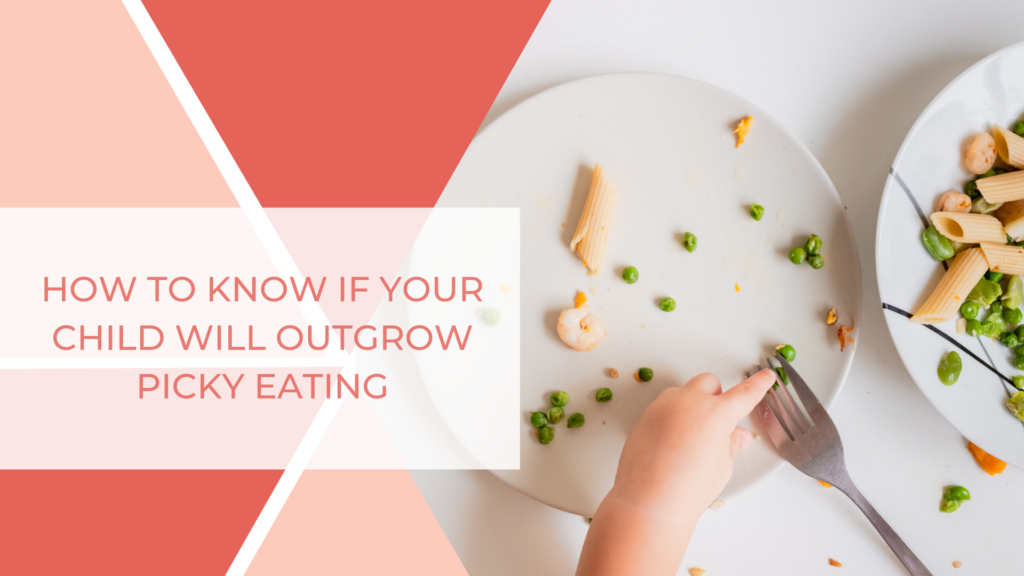This article will help you better understand if your child will outgrow picky eating.

When your child was younger, eating was easier. Then, something changed. All of the sudden, they started rejecting the foods they used to love. They stopped trying new foods. The foods they did eat had to be “just right.”
You were told picky eating would be just a phase. But the way things have been going, it seems like you’re looking at a lifetime of dinnertime battles. So you’ve started wondering: do any children not outgrow picky eating?
This article will provide you with a framework for how to think about your child’s picky eating, better predict if they will outgrow picky eating, and also learn steps you can take to make eating challenges easier on you and your child.
How to Know If Your Child Will Outgrow Picky Eating
Picky Eating 101
Picky eating is extremely common for toddlers, so much so that it’s considered normal. An estimated 20-30% of children struggle with eating, including picky eating, within the first 6 years of life and anecdotal reports estimate closer to over 50%.
Often, eating struggles are due to a number of normal developmental changes including decreased nutritional needs, increased desire for autonomy and heightened taste buds, an evolutionary mechanism to protect against eating potentially poisonous foods.
The Picky Eating Spectrum
Picky eating is so mundane that any child with a selective palate or limited diet gets labeled as a picky eater. In reality there is a huge spectrum of what picky eating can look like (this is one of the reasons why I advocate for not calling kids “picky”)
On one hand, there are the “typical” picky eaters, who check the boxes of the typical developmentally phase – becoming more selective and discerning of both new and preferred foods around the age of 2 and naturally outgrowing these behaviors a few years later without experiencing any negative physical or social impacts.
On the other end of the spectrum are diagnoses more extreme cases of “picky eating,” like ARFID and pediatric feeding disorder (PFD), both of which address more severe consequences of a limited diet, such as failure to meet nutritional needs and/or maintain weight and impaired nutritional status and/or psychosocial functioning.
Both ARFID and PFD are relatively new diagnoses and they still don’t capture every child who might struggle to eat, which is why you might come across terms such as extreme picky eater or problem feeder.
The bottom line is that there is not one type of picky eater.
Will They Outgrow Picky Eating or Not?
When your 2 year old begins to reject the broccoli or blueberries that they used to eat by the handful, there’s no reason to worry you’re facing a prolonged challenge.
Many kids do naturally outgrow their particular preferences and resistance to trying new foods. by their 5th or 6th birthday. But many don’t. There are some estimates that over 50% of children will continue to struggle with their eating until grade school and beyond.
Children with persistent eating challenges likely aren’t “typical picky eaters” and might align more closely with symptoms of PFD or ARFID. For these kids, there are likely underlying factors that contribute to their limited diet and resistance to trying new foods.
Signs Picky Eating Might Be More Than A “Phase”
Parents often come to me wondering if their child will outgrow their eating challenges and if I think it’s just a phase. Essentially they’re asking if it’s worth riding out the storm or is it better to get ahead of something that could potentially persist.
It’s impossible to predict the future and every child is so different. That being said, there are signs that might distinguish more extreme eating challenges from “typical” picky eating –
If their diet:
- Excludes entire food groups
- Is getting smaller
If they:
- Have not tried a new food in a long time
- Are uncomfortable having new foods on their plate or just nearby
- Have anxiety around eating
- Cannot eat without “their” food (at restaurants, friends’ houses, birthday parties, etc)
….they might be experiencing a more extreme case of picky eating, which they may be less likely to outgrow.
If your child is experiencing any changes to their weight or health or have symptoms of potential nutrient deficiencies, consult their pediatrician.
Additionally, if you think your child is experiencing a more severe case of picky eating, it’s important to look into potential issues such as deficient oral motor skills, food allergies, and digestive issues that could be preventing them from comfortably eating a varied diet.
Helping An Extremely Picky Eater Who Might Not Outgrow Picky Eating
While it might seem hopeless and like you’ve tried everything to help your child try new foods and eat more variety, children with severe eating challenges make progress with their eating every single day.
I help parents understand their child’s extreme eating challenges and learn how to help their kids comfortably try new foods and eat more variety.
If you are looking for help with your child’s eating, are worried their picky eating is not a phase, or are wondering what support for extreme picky eating looks like, book a call so we can have a no-pressure conversation to give you more clarity.




0 Comments